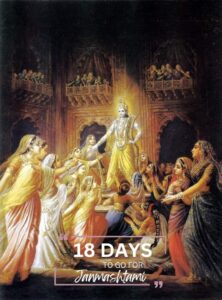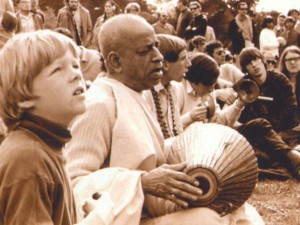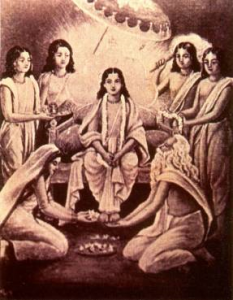Chicago july 11 1975
Tamāla Kṛṣṇa: I think there was one great personality—I forget his name—he was going to live as long as how many millions of years that he had hairs in his head. What is that story?
Brahmānanda: The story of the man who was on the beach…
Prabhupāda: Ah, yes. Romaharṣaṇa. Romaharṣaṇa Muni was standing on beach and was chanting. So Nārada Muni was passing: “Then why don’t you make a cottage here?” He was: “Oh, how long I shall…?” That, his life, was: when one hair will fall, one Brahmā will die. (laughter) And in this way all the hairs, when they will fall—all the Brahmās will die—then he will die. And he was thinking, “How…?” Actually that is a fact.
[note-Romaharsana rekplied to Nartada-why build a cottage or hut to protect me from the hot sun when life is so temporary?]
Tamāla Kṛṣṇa: Who was that, Romaharṣaṇa Muni?
Prabhupāda: Romaharṣaṇa. [break] …basic principle of Vedic civlization. They did not… Vyāsadeva, such a learned scholar, he was sitting in a cottage. Lord Śiva, such a big powerful, and the whole material energy, Parvati, is his wife—he is sitting under a tree.
Tamāla Kṛṣṇa: Therefore a sannyāsī is always moving around, Śrīla Prabhupāda?
Prabhupāda: Yes. Vairāgya. That is required. That is civilization. Vairāgya and jñāna. Jñāna-vairāgya, knowledge and renunciation, or detachment, this is the goal of human life. Because he is attached to this material world, he has to take birth after birth, birth after birth. So to save this botheration, one has to be detached. This is the basic principle of Vedic civilization, jñāna-vairāgya. And detachment is possible when one is in full knowledge, jñāna. And this bhakti-yoga process is detachment. Vairāgya-vidyā-nija-bhakti-yogam [Cc. Madhya 6.254]. So it is a civilization of detachment, not attachment.
Tamāla Kṛṣṇa: That detachment is a form of wealth for the renounced order.
Prabhupāda: Yes, that is the gain of human life. Arthadam. This is meaning. Artha means meaning. Arthadam. Durlābhaṁ mānuṣaṁ janma tad apy adhruvam arthadam. This human life, form of life, is very, very rare. So one can say, “You will also die like cats and dog. How it is rare?” No, yes, adhruvam arthadam: “Although it is temporary, it will not stay, but you can have meaning of life.” Adhruvam arthadam. Everything is there.
Tamāla Kṛṣṇa: The materialistic people say that… When they see someone in the detached position, they say, “He is impoverished.” They are so confused that they conclude the opposite.
Prabhupāda: Impoverished?
Tamāla Kṛṣṇa: Impoverished means they are poor.
Prabhupāda: Then what is the poor? What you are rich? You are whole day working day and night, and we are not working, getting our prasādam. I am poverty-stricken, or you are poverty-stricken? You rascal, whole day you are working…
Brahmānanda: For a dry biscuit.
Prabhupāda: …like an ass, and we are getting, sitting, chanting Hare Kṛṣṇa and getting our food. So you are poverty-stricken or I am poverty-stricken?
Tamāla Kṛṣṇa: A poverty-stricken man has to work very hard.
Prabhupāda: Yes.
Lakṣmī-nārāyaṇa: But they will say, “Well…”
Prabhupāda: They will say… First of all you see. You try to understand that this rascal is working day and night twenty-four hours for getting his food, and we are simply chanting Hare Kṛṣṇa and getting our food. So he is poverty-stricken or I am poverty-stricken?
Brahmānanda: That means we’re the rich men.
Prabhupāda: I am rich man.
Brahmānanda: Rich man doesn’t have to work, and everything comes.
Prabhupāda: Yes, that is rich man.
If you have grains, then you are rich—SP
June 19 1973 mayapura
So by Kṛṣṇa’s grace if we actually become dharmic, follow Kṛṣṇa, the milk supply will be so profuse that everyone, even the animals can take the butter and yogurt. That is wanted. That is civilization. Produce sufficient quantity of grains, let the milk, cows, supply sufficient quantity of milk. All economic question solved. There is no use of industry. No use of man’s going fifty miles to work. No, there is no need. Simply land and cows. Here is the statement. Kāmaṁ parjanyaḥ, vavarṣa parjanyaḥ sarva-kāma-dughā. Everything you’ll get from the land. Even luxury articles. What can be more luxurious article than the jewels? The jewels are also produced. The medicine is produced, the minerals are produced, gold is produced, diamond is produced from the earth. Sarva-kāma-dughā. You get everything. Make your civilization very perfect, very luxurious simply by satisfying Kṛṣṇa. This is Kṛṣṇa consciousness movement.
Thank you very much. (end)
760628rc.nv
Prabhupāda: Yes. Dhānyena dhanavān. If you have got grain, then you are rich. And if you have got cows, then you are rich. This is the standard of Vedic richness. Dhānyena dhanavān gavayo dhanavān. They don’t say, “Keep some papers and you become rich.” All rascal, one thousand dollar I promise to pay, a piece of paper. Practical, we have got enough food grains. We have got enough… That is richness. What is use of paper? Even gold you have got, you have to exchange. And if you have grain, immediate food. Just boil with milk, and it is nectarean, param anna, immediately. Take some wood collected from the wood and have fire, put the milk and the grains-oḥ, you’ll get so nice food, nutritious, full of vitamin, and so easily made. It is practical. So tasteful, so nutritious, and don’t require. If you simply boil little milk and little grain, whole day, so much sweet rice, you take-bas. You don’t require any more. And if you add little apples and fruits, oh, it is heavenly. Your whole day free from any food anxiety, and you can work. And you can work. You can chant Hare Kṛṣṇa. Make this ideal life here. America has got good potency. We have got so much land here. We can have hundreds of New Vrindabans or farms like that. And people will be happy. And invite all the world, “Please come and live with us. Why you are suffering congestion, overpopulation? Welcome here. Chant Hare Kṛṣṇa.”



